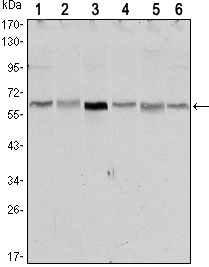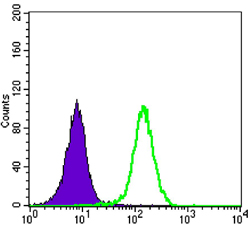LKB1 Monoclonal Antibody
- Catalog No.:YM0418
- Applications:WB;FCM;ELISA
- Reactivity:Human;Mouse;Monkey
- Target:
- LKB1
- Fields:
- >>FoxO signaling pathway;>>Autophagy - animal;>>mTOR signaling pathway;>>PI3K-Akt signaling pathway;>>AMPK signaling pathway;>>Longevity regulating pathway;>>Tight junction;>>Adipocytokine signaling pathway
- Gene Name:
- STK11
- Protein Name:
- Serine/threonine-protein kinase 11
- Human Gene Id:
- 6794
- Human Swiss Prot No:
- Q15831
- Mouse Gene Id:
- 20869
- Mouse Swiss Prot No:
- Q9WTK7
- Immunogen:
- Purified recombinant fragment of human LKB1 expressed in E. Coli.
- Specificity:
- LKB1 Monoclonal Antibody detects endogenous levels of LKB1 protein.
- Formulation:
- Liquid in PBS containing 50% glycerol, 0.5% BSA and 0.02% sodium azide.
- Source:
- Monoclonal, Mouse
- Dilution:
- WB 1:500 - 1:2000. Flow cytometry: 1:200 - 1:400. ELISA: 1:10000. Not yet tested in other applications.
- Purification:
- Affinity purification
- Storage Stability:
- -15°C to -25°C/1 year(Do not lower than -25°C)
- Other Name:
- STK11;LKB1;PJS;Serine/threonine-protein kinase STK11;Liver kinase B1;LKB1;hLKB1;Renal carcinoma antigen NY-REN-19
- Molecular Weight(Da):
- 49kD
- References:
- 1. Sci Signal. 2009 Jul 21;2(80):ra35.
2. Sci Signal. 2009 Sep 1;2(86):pe55.
- Background:
- This gene, which encodes a member of the serine/threonine kinase family, regulates cell polarity and functions as a tumor suppressor. Mutations in this gene have been associated with Peutz-Jeghers syndrome, an autosomal dominant disorder characterized by the growth of polyps in the gastrointestinal tract, pigmented macules on the skin and mouth, and other neoplasms. Alternate transcriptional splice variants of this gene have been observed but have not been thoroughly characterized. [provided by RefSeq, Jul 2008],
- Function:
- catalytic activity:ATP + a protein = ADP + a phosphoprotein.,cofactor:Magnesium or manganese.,disease:Defects in STK11 are a cause of Peutz-Jeghers syndrome (PJS) [MIM:175200]. PJS is a rare hereditary disease in which there is predisposition to benign and malignant tumors of many organ systems. PJS is an autosomal dominant disorder characterized by melanocytic macules of the lips, multiple gastrointestinal hamartomatous polyps and an increased risk for various neoplasms, including gastrointestinal cancer.,disease:Defects in STK11 have been associated with testicular tumors [MIM:273300]. It includes germ cell tumor (GCT) or testicular germ cell tumor (TGCT).,enzyme regulation:Activated by binding of a complex consisting of CAB39 and STRAD or CAB39 and ALS2CR2.,function:Essential role in G1 cell cycle arrest. Phosphorylates and activates members of the AMPK-related subfamily of protein ki
- Subcellular Location:
- Nucleus. Cytoplasm. Membrane . Mitochondrion. A small fraction localizes at membranes (By similarity). Relocates to the cytoplasm when bound to STRAD (STRADA or STRADB) and CAB39/MO25 (CAB39/MO25alpha or CAB39L/MO25beta). Translocates to the mitochondrion during apoptosis. PTEN promotes cytoplasmic localization. .; [Isoform 2]: Nucleus . Cytoplasm . Predominantly nuclear, but translocates to the cytoplasm in response to metformin or peroxynitrite treatment.
- Expression:
- Ubiquitously expressed. Strongest expression in testis and fetal liver.
- June 19-2018
- WESTERN IMMUNOBLOTTING PROTOCOL
- June 19-2018
- IMMUNOHISTOCHEMISTRY-PARAFFIN PROTOCOL
- June 19-2018
- IMMUNOFLUORESCENCE PROTOCOL
- September 08-2020
- FLOW-CYTOMEYRT-PROTOCOL
- May 20-2022
- Cell-Based ELISA│解您多样本WB检测之困扰
- July 13-2018
- CELL-BASED-ELISA-PROTOCOL-FOR-ACETYL-PROTEIN
- July 13-2018
- CELL-BASED-ELISA-PROTOCOL-FOR-PHOSPHO-PROTEIN
- July 13-2018
- Antibody-FAQs
- Products Images

- Western Blot analysis using LKB1 Monoclonal Antibody against NIH/3T3 (1),Raw246.7 (2), COS7 (3), Jurkat (4), HEK293 (5) and A431 (6) cell lysate.

- Flow cytometric analysis of K562 cells using LKB1 Monoclonal Antibody (green) and negative control (purple).



